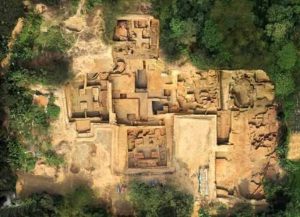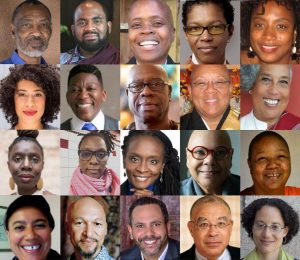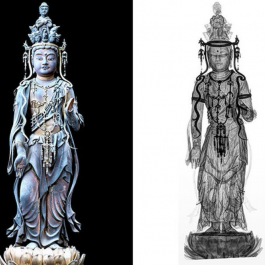
In this three-part series, Pure Land columnist Alan Kwan examines the three most important vows of Amitabha Buddha’s forty-eight vows, which constitute Amitabha’s plan for saving sentient beings. These are known as the Three Vows of Deliverance.
The 19th Vow – faith in aspiration
The 19th vow states: If, when I attain Buddhahood, sentient beings in the lands of the ten quarters, who set forth the Bodhi Mind, do various meritorious deeds and sincerely aspires for Enlightenment, and desire to be born in my land, should not, at their death, see me appear before them surrounded by a multitude of sages, may I not attain perfect Enlightenment.
For the 19th vow, the practitioners start to ‘set forth the Bodhi Mind, and do various meritorious deeds’ [practice]. Then they ‘sincerely aspire for Enlightenment (in pursuit of Buddhahood in the Pure Land) [faith], thus they finally ‘desire to be reborn’ in the Land of Bliss [aspiration].

The sequence of the ‘Three Sambhara’ is ‘practice, faith and aspiration.’ The practitioners take the ‘aspiration’ approach, as their faith is based on aspiration. They ‘sincerely aspire (to be reborn there) for Enlightenment,’ in order to expedite their Bodhisattva practices in the Pure Land and their pursuit of Buddhahood.
First of all, it is noted that, under the 19th vow, the practitioner is likely a Buddhist who has come across the Bodhisattva teaching, or has listened to the Buddha’s teachings. He has an ambitious determination to become a Buddha (Bodhi Mind – to achieve Buddhahood above and deliver sentient beings below). Subsequently, he has to take all kinds of Bodhisattva practices in terms of precepts, meditation and wisdom, Six Paramitas, etc.
To ‘do various meritorious deeds’ includes all meditative and non-meditative virtuous practices, in accordance with the teaching of Shakyamuni Buddha. However, due to some splendid causal conditions, these practitioners come across Pure Land teaching, and learn about Amitabha Buddha and his splendid Pure Land. They want to continue and expedite their own Bodhisattva practices in the Pure Land with the guidance and supervision of Amitabha Buddha and other sagely Bodhisattvas in the Land of Bliss.
Subsequently, they set an intermediate goal and aspire to be reborn in the Land of Bliss. Because they have faith in expediting their achievement of perfect Enlightenment (Buddhahood) in Amitabha’s Pure Land, they desire to be reborn there.
There are at least three different expeditions as indicated by Master Tanluan in his Commentary of the Treatise of Rebirth, namely,
(1) The expedition of liberation from the cycle of birth and death, which is the fulfillment of the 18th vow
(2) The expedition of achieving the state of non-retrogression in the Bodhisattva practice, which is the fulfillment of the 11th vow
(3) The expedition of prediction of Buddhahood, which is the fulfillment of the 22nd vow
As a result, Amitabha Buddha gives them a helping hand and welcomes them to be reborn in the Land of Bliss. Amitabha Buddha promises in his 19th vow: ‘at their death, see me appear before them surrounded by a multitude of sages.’ It means: when a practitioner, who wishes to start another new life in the Land of Bliss to continue his or her Bodhisattva practices towards Buddhahood, comes to the end of his or her life, Amitabha Buddha will appear and receive him or her in this appropriate moment.
It should be noted that the practitioners take the ‘aspiration’ approach, and it is their own effort (‘self-power’) and initiative to be reborn in the Land of Bliss, so as to continue and expedite in achieving Enlightenment. At their present life, they continue to do various meritorious deeds through their own effort and then dedicate all these merits and virtues and aspire to be reborn in the Land of Bliss.
Dedication and aspiration is important in this scenario because ‘self-power’ is involved. All the merits and virtues attained through various meritorious deeds in the mundane world are not compatible with the Land of Bliss, thus they must de dedicated to all other beings before the practitioners are reborn in the Land of Bliss. Dedication means ‘sincere aspiration’, as the practitioners choose, at their discretion, to be reborn in the Land of Bliss. It is also known as the Path of Importance in Pure Land Buddhism, as defined by Master Shandao.
In this case, Amitabha Buddha plays a passive role, as compared with his active role in the 18th vow, and he operates in co-ordination with the practitioner as far as his rebirth in the Land of Bliss is concerned. Therefore, no assurance is necessary and no guarantee is provided by Amiatbha Buddha, because the practitioners merely want to take advantage of the ideal environment of the Land of Bliss, and the guidance of other sagely Bodhisattvas, who can help them to expedite the attainment of perfect Enlightenment (the achievement of Buddhahood.
In this scenario, it is up to the practitioner’s discretion to decide the time of rebirth in the Land of Bliss. At the near end of his death, if he decides firmly to go to the Land of Bliss, and calls upon Amitabha Buddha, Amitabha Buddha will satisfy his wish, then appear and welcome him to the Land of Bliss if he wants to go there. If he has other plans for their next destiny and wishes to postpone his rebirth in future lives, Amitabha Buddha will respect his decision and wait for another opportunity to receive him in the Land of Bliss.
As the practitioner’s decision is made near the end of death, the chance of being reborn in the Land of Bliss under the 19th vow is not 100%. No one knows what happens near the end of life. No one knows when he dies, how he dies, etc. Moreover, many adverse factors and trivial matters may arise and prevent the practitioner from thinking of Amitabha Buddha.
The practitioner may require other Buddhist friends to assist in Amitabha-recitation so as to remind him / her to be mindful of Amitabha Buddha, and to make the firm decision of rebirth in the Land of Bliss. There are some uncertainties and variants in this scenario, thus the chance of rebirth of the practitioner is not 100%.
It is also important to note that the practitioner’s confidence to attain rebirth fluctuates in this scenario. If he or she practices various meritorious deeds more diligently in his or her present life, confidence arises. If he or she slackens in the Bodhisattva practices, he or she falls back in the pursuit of Enlightenment, or even worse, loses his or her Bodhi Mind in his or her present life, resulting in his or her not wanting to go to the Land of Bliss to continue his or her Bodhisattva practices.If the Pure Land practitioner attempts to be reborn in the Land of Bliss by practicing various meritorious deeds, including meditative and non-meditative virtues, and then dedicate the merits and virtues for rebirth in the Land of Bliss, his chance of rebirth is slim. Simply speaking, if we rely on Amitabha Buddha, our rebirth is assured; if we rely on ourselves, the chance of rebirth is remote.






